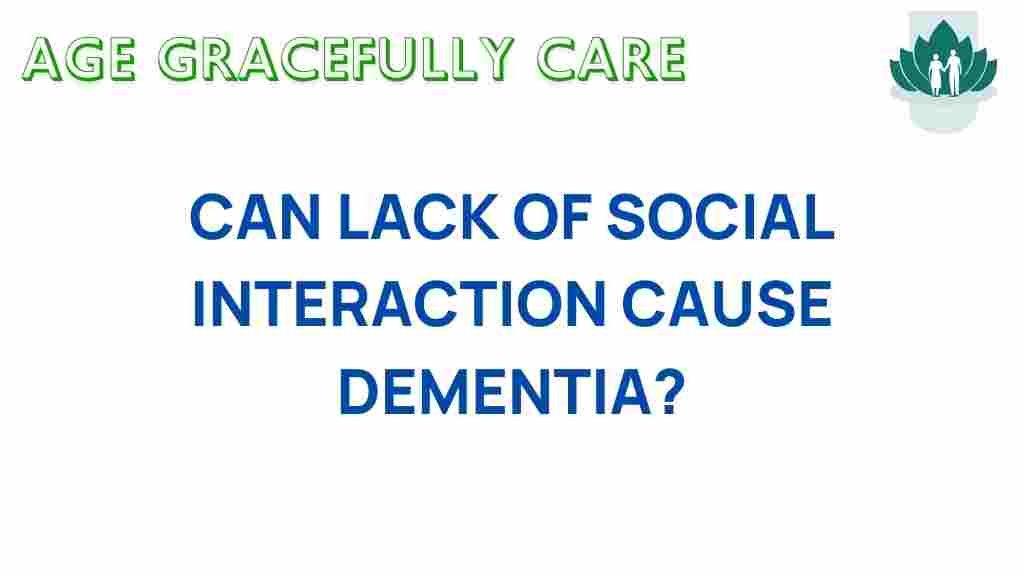Can Social Isolation Fuel the Onset of Dementia?
As we age, our mental health becomes increasingly important. The elderly population faces numerous challenges, including social isolation, which can significantly impact their overall well-being. Emerging research suggests a strong link between social isolation and the onset of dementia, a condition characterized by cognitive decline and memory loss. This article delves into how social isolation can affect brain health in elderly individuals, the importance of community support, and strategies for enhancing wellness in aging populations.
The Connection Between Social Isolation and Dementia
Social isolation is defined as a lack of social interactions, relationships, and support networks. This condition is particularly prevalent among the elderly, who may have lost friends and family members or face mobility issues that limit their ability to engage socially. Scientific studies indicate that social isolation can have severe ramifications for mental health and cognitive function, potentially accelerating the onset of dementia.
Research has shown that individuals who experience chronic loneliness or social isolation are at a higher risk of cognitive decline. In fact, a study published in JAMA Psychiatry found that social isolation was associated with increased rates of dementia. This connection can be attributed to several factors:
- Reduced Mental Stimulation: Social interactions stimulate the brain, helping to maintain cognitive functions. Isolation limits these interactions.
- Emotional Stress: Loneliness can lead to anxiety and depression, which are known risk factors for dementia.
- Physical Health Decline: Socially isolated individuals may neglect their physical health, leading to conditions that can exacerbate cognitive decline.
Understanding Mental Health and Aging
Mental health plays a crucial role in the overall wellness of elderly individuals. As people age, they may experience a decline in cognitive abilities, which can be exacerbated by social isolation. Here are some key points to understand:
- Cognitive Decline: This refers to the deterioration of cognitive functions such as memory, reasoning, and problem-solving. It can occur naturally with age but is accelerated by factors like social isolation.
- Loneliness: Many older adults experience loneliness, which can have a profound effect on their mental health and cognitive function.
- Brain Health: Maintaining brain health through social interactions, physical activity, and mental challenges is essential for preventing cognitive decline.
Step-by-Step Process: Combating Social Isolation
Addressing social isolation in the elderly requires a multifaceted approach. Here’s a step-by-step process to help mitigate the effects of isolation and promote mental health:
1. Identify Isolated Individuals
Community members, caregivers, and family members should be vigilant about identifying elderly individuals who may be socially isolated. Signs of social isolation include:
- Limited social interactions or engagements
- Withdrawal from previously enjoyed activities
- Signs of depression or anxiety
2. Encourage Social Engagement
Once individuals are identified, encourage them to engage in social activities. Options include:
- Joining community centers or clubs
- Participating in group activities like exercise classes or art workshops
- Attending local events or cultural gatherings
3. Facilitate Technology Use
In today’s digital age, technology can help bridge the gap for socially isolated individuals. Teaching elderly people how to use video calls, social media, and messaging apps can enhance their connection with family and friends.
4. Promote Community Support Programs
Local organizations can establish programs aimed at reducing social isolation among the elderly, such as:
- Meal delivery services that include social interaction
- Volunteer programs connecting youth with seniors
- Regular check-in calls from volunteers or staff
5. Prioritize Mental Health Services
Access to mental health services for the elderly is vital. Encourage regular mental health check-ups and promote awareness of available resources, including:
- Therapy or counseling services
- Support groups for seniors experiencing loneliness
- Hotlines for immediate emotional support
Troubleshooting Tips for Addressing Loneliness
Despite best efforts, some individuals may continue to experience feelings of loneliness. Here are some troubleshooting tips:
1. Create a Routine
Help seniors establish a daily routine that includes social activities. This structure can provide a sense of purpose and regular engagement.
2. Foster Intergenerational Connections
Encouraging interactions between different age groups can enhance social ties. Consider programs that bring together youth and seniors for shared activities.
3. Utilize Local Resources
Many communities offer resources and programs aimed at reducing social isolation. Check local libraries, community centers, and health organizations for available support.
4. Encourage Physical Activity
Physical activity can boost mood and promote socialization. Encourage participation in group exercise classes or walking clubs.
The Importance of Community Support
Community support plays a vital role in combating social isolation and promoting mental health. Strong community ties provide emotional support, practical assistance, and opportunities for social engagement. Here are some benefits of community support:
- Increased Social Interaction: Communities can offer numerous opportunities for socialization, reducing feelings of loneliness.
- Emotional Support: Being part of a community helps individuals feel valued and connected, which is essential for mental wellness.
- Resource Availability: Communities often provide access to resources such as healthcare, transportation, and recreational activities.
Conclusion
In conclusion, social isolation can significantly impact the mental health and cognitive function of elderly individuals, potentially fueling the onset of dementia. It is crucial to recognize the signs of social isolation and implement strategies to promote engagement and community support. By fostering connections, encouraging social interactions, and prioritizing mental health, we can enhance wellness in aging populations and support brain health.
As we move forward, it is essential to ensure that no elderly individual feels isolated. Community programs, family involvement, and increased awareness can help combat loneliness and create a supportive environment for our aging population.
For more resources on elderly care and community support, visit here.
This article is in the category Health and created by AgeGracefullyCare Team
